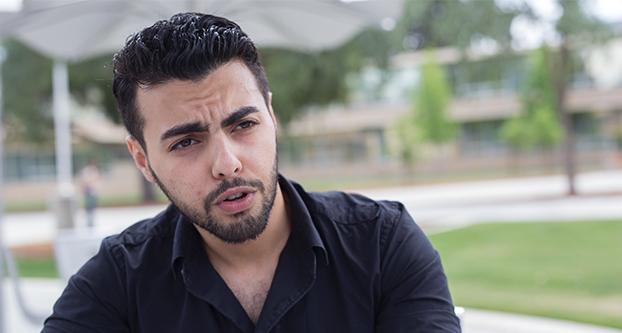The uprising against the Syrian government began on social media, and Fresno State international student Fares Al Malham found himself in the middle of it all.
“From the beginning, our revolution [was] to take [Bashar Al-Assad] away from the rule,” Al Malham said. “I used to write about it.”
Since the violent conflicts in Syria began approximately seven years ago, about 200 people known to Al Malham have died, including about 25 cousins and close friends. They were not killed by ISIS, Al Malham said. Instead, cries for freedom were met with deadly force by the Syrian government, led by Assad.
“There is no freedom of speech, no freedom [for] journalists or media. Everything is controlled by the government,” Al Malham said. “So, people don’t even think about it. They don’t think to say any words against the government.”
As a young adult, Al Malham’s efforts to “take down the government” began with joining others in using fake social media accounts that helped inform those within Syria and those outside of the country. He said he had about 5,000 fans online who followed him as he wrote about the civil war.
Al Malham, a junior political science student, threw himself into one of the major geopolitical crises of the 21st century. Syria is home to many interests — Americans Barack Obama and Donald Trump, Russia’s Vladimir Putin and heads of state throughout Europe who have taken interest in the war — and the civil war alone is as complex as Middle East politics.
There are more than two sides fighting for control in the country that is at the crossroads of Middle Eastern, Mediterranean and European civilization. And it is brutal. Tens of thousands have died, many at the hands of Assad’s forces.
Al Malham cares and agonizes about it all.
Online platforms helped activists organize people in order to aide protests against the government, Al Malham said. People were gradually gaining courage to speak out against the government.
Al Malham said the Syrian civil war turned bloody on March 25, 2011, when government forces killed close to 1,000 civilians. Protests had begun to grow after a group of children was arrested March 9, 2011. Protests urging their release led to four civilian deaths, he said.
“It’s not easy,” Al Malham said. “We asked for the freedom, and this is what we get.”
Al Malham said many people in Syria, including him, never realized exactly how controlling the government was until the revolution, which was given the name “Arab Spring” since many other neighboring countries saw uprisings against their governments.
Since living in the U.S., Al Malham said he has been able to teach others about the reasons many people leave Syria, starting journeys across oceans and across many countries. Al Malham said the atrocities created by the Syrian government are often not discussed.
“We are trying to teach people here in the U.S. about what is going on in Syria to take them away from the terrorist groups and take them back to the real situation and what’s happening in Syria,” Al Malham said.
In Fresno, Al Malham finds himself helping fellow Syrians. He said he has learned that about 17 families now call an area near Fresno State home. He doesn’t want to treat them like refugees, he said. Instead, he treats the ones he meets like family, and he said they are thankful for what they have.
“For all [the] bad situations they had before — from the crisis, even [migrating] from country to country — they are very nice,” Al Malham said.
Al Malham is not involved in any groups or organizations that would lead him to refugee families. He only found out there were families from Syria living in Fresno after he watched the local news. And while his immediate family was not affected by the Syrian civil war, Al Malham said helping those who were affected gives him a way to still fight for his people.
Al Malham’s parents and siblings now live in Saudi Arabia. He lived in Syria’s capital, Damascus, after leaving Homs. Following his political science studies at Fresno State, Al Malham will return to Saudi Arabia, even though his hopes are to return to his home country.
Al Malham says President Trump could help end the conflicts in Syria if he chooses to take more serious action there. An executive order banning travel from Middle Eastern countries for security purposes gives Al Malham hope that Trump could send a strong message to the Assad government. The travel ban orders are stalled in the courts, awaiting review.
Al Malham’s hopes are for refugees to return to their country and live in peace.
“People, they don’t want to come here. They have their homeland, they have their home, they have their memories, their lives,” Al Malham said. “They don’t want to leave their country. The situation over there just made them come over here.”
Al Malham said he hopes Assad is removed from office. It has been the goal all along since the revolution began.
“If we take Bashar Al-Assad out — he is the biggest problem in Syria — if he left, the refugees would get back immediately,” Al Malham said. “If he is going to stay there, nobody is going to be there.”




